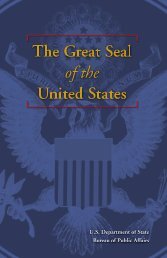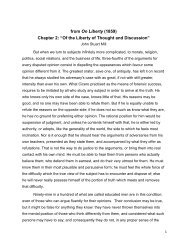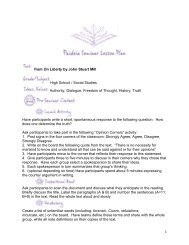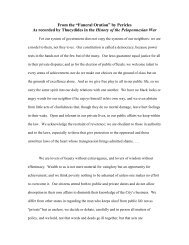Rousseau_contrat-social
Create successful ePaper yourself
Turn your PDF publications into a flip-book with our unique Google optimized e-Paper software.
force of circumstances tends continually to destroy equality that the<br />
force of legislation should always tend to its maintenance.<br />
But these general objects of every good legislative system need<br />
modifying in every country in accordance with the local situation and<br />
the temper of the inhabitants; and these circumstances should determine,<br />
in each case, the particular system of institutions which is best, not<br />
perhaps in itself, but for the State for which it is destined. If, for<br />
instance, the soil is barren and unproductive, or the land too crowded<br />
for its inhabitants, the people should turn to industry and the crafts,<br />
and exchange what they produce for the commodities they lack. If, on the<br />
other hand, a people dwells in rich plains and fertile slopes, or, in a<br />
good land, lacks inhabitants, it should give all its attention to<br />
agriculture, which causes men to multiply, and should drive out the<br />
crafts, which would only result in depopulation, by grouping in a few<br />
localities the few inhabitants there are.[17] If a nation dwells on an<br />
extensive and convenient coast-line, let it cover the sea with ships and<br />
foster commerce and navigation. It will have a life that will be short<br />
and glorious. If, on its coasts, the sea washes nothing but almost<br />
inaccessible rocks, let it remain barbarous and ichthyophagous: it will<br />
have a quieter, perhaps a better, and certainly a happier life. In a<br />
word, besides the principles that are common to all, every nation has in<br />
itself something that gives them a particular application, and makes its<br />
legislation peculiarly its own. Thus, among the Jews long ago and more<br />
recently among the Arabs, the chief object was religion, among the<br />
Athenians letters, at Carthage and Tyre commerce, at Rhodes shipping, at<br />
Sparta war, at Rome virtue. The author of The Spirit of the Laws has<br />
shown with many examples by what art the legislator directs the<br />
constitution towards each of these objects. What makes the constitution<br />
of a State really solid and lasting is the due observance of what is<br />
proper, so that the natural relations are always in agreement with the<br />
laws on every point, and law only serves, so to speak, to assure,<br />
accompany and rectify them. But if the legislator mistakes his object<br />
and adopts a principle other than circumstances naturally direct; if his<br />
principle makes for servitude while they make for liberty, or if it<br />
makes for riches, while they make for populousness, or if it makes for<br />
peace, while they make for conquest -- the laws will insensibly lose<br />
40











